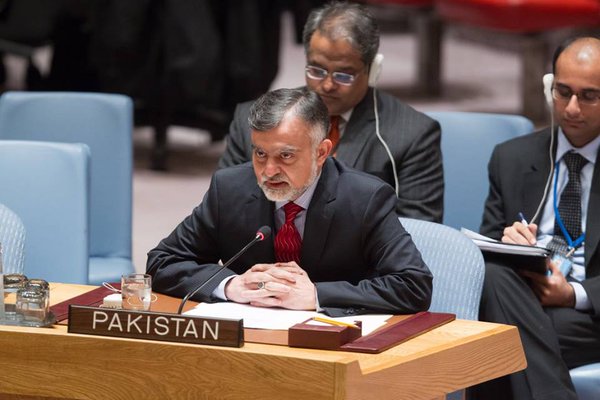Pakistan has called for strengthening international cooperation to combat intensifying terrorism, saying no country alone can defeat this menace.
“While our resolve remains firm, our mission remains unaccomplished,” Nabeel Munir, Pakistan’s deputy permanent representative to the United Nations, told the U.N. General Assembly on Thursday, while reaffirming Islamabad’s commitment to eliminate terrorism “regardless of the cost”.
“The sad events of the past few days in Turkey, Bangladesh, Afghanistan and Saudi Arabia have served as a harrowing reminder of the challenge we face today, a reminder that our task does not finish with the adoption of the resolution,” he said, referring to the text adopted last week by the 193-member Assembly that gave a clarion call to member states to unite in fighting terrorism.
The only way forward in this fight was to strengthen international cooperation, and that the United Nations was the best vehicle to accomplish that objective, the Pakistan delegate said as the Assembly concluded its debate on the U.N. Global Counter-Terrorism Strategy on Thursday.
By the terms of the resolution, which was adopted at the start of the debate, the Assembly affirmed the importance of integrated and balanced implementation of all four pillars of the Strategy: addressing conditions conducive to the spread of terrorism; preventing and combating terrorism; building the capacity of States and strengthening the role of the United Nations; and ensuring respect for human rights and compliance with the rule of law.
Condemning terrorism in all its forms and manifestations, Munir said Pakistan had made huge sacrifices in this battle, “yet we persevere – our resolve and determination continues to strengthen”.
Since the Global Strategy’s adoption 10 years ago, he said, Pakistan had accorded high importance to its implementation. Few countries could match its efforts for counter-terrorism or its sacrifices.
The law enforcement operation, Zarb-e-Azb, one of the largest national counter-terrorism operations in the world, had resulted in significant successes, the Pakistani delegate said.
He pointed to the creation of special courts for terrorist offenders, arms control measures and the strengthening of the National Counter Terrorism Authority and the Financial Monitoring Unit. Last year, the United Nations Financial Action Task Force had acknowledged that Pakistan’s counter-terrorism financing steps were in line with United Nations recommendations.
Pakistan’s 20-point national action plan to counter terrorism, Munir said, had focused on prevention and included measures to end hate speech and sectarian violence, protect minorities, prevent exploitation of the media and Internet by terrorists and violent extremists, develop an effective counter-narrative campaign against terrorist propaganda, reform the education system and register and regularize madrasas.
The plan also included political reconciliation and economic revitalization programmes for targeted areas, criminal justice sector reform and the registration of refugees. In line with a “whole of society” approach, he aid the Government had taken steps to promote and protect women rights, enhance the capacity of law enforcement agencies and harness youth’s potential.
Pakistan was also working with the Counter-Terrorism Implementation Task Force on youth skills development and the Counter-Terrorism Committee Executive Directorate to enhance the criminal justice sector’s capacity.
“Let me assure you of Pakistan’s continued and tireless efforts to counter terrorism and prevent violent extremism nationally, regionally and internationally, as well as our constructive engagement with other member states at the United Nations to build a consensual and normative framework to counter terrorism and violent extremism,” Munir told the General Assembly. (APP)






